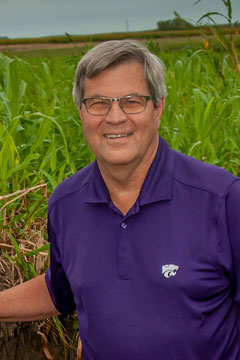Rice selected for National Academies committee studying greenhouse gases and US climate

Charles Rice, university distinguished professor of agronomy in the College of Agriculture at Kansas State University, was selected to serve on a National Academies of Sciences, Engineering, and Medicine committee to study human-caused greenhouse gas emissions and its impact on public health in the United States.
In 2009, the U.S. Environmental Protection Agency, EPA, ruled that carbon dioxide, or CO2, is considered a pollutant because of its impact on climate and endangerment to public and planetary health, Rice said, and in August 2025, the EPA indicated its intention to rescind these findings.
The committee, comprised of 16 high-level experts with backgrounds in climate change, human health, ecosystem services, water infrastructure and agriculture, was tasked to study the latest evidence of greenhouse gas emissions and whether it has changed since the 2009 ruling. Rice was selected to serve as the expert on the agriculture sector.
For about six weeks, the committee fast-tracked the study, which included an open comment period where the public could submit material for the committee to consider. According to Rice, the committee’s report concludes that the EPA’s 2009 findings were accurate.
“What we found was that the evidence is still there, and if anything, that it has strengthened,” Rice said. “For the agriculture sector, what we've shown is that temperatures have increased and we're seeing more extreme events, such as higher intensity rainfall events, and then we're seeing drier periods in between. These changes make it more challenging and costly for crop and livestock production.”
Rice specializes in soil microbiology, carbon cycling and climate change. He is a co-winner of the 2007 Nobel Peace Prize for his work with the United Nations’ Intergovernmental Panel on Climate Change.
Read more about the committee’s work and view the completed report on the National Academies website.